|
De Zuid-Afrikaanse schrijver André Brink werd geboren op 29 mei 1935 in Vrede. André Brink overleed op 6 februari jongstleden. Zie ook alle tags voor André Brink op dit blog.
Uit: A Fork in the Road
“It was in the late afternoon of a blue and golden late summer’s day, Thursday 18 April, 1963, that Ingrid walked into my ordered existence and turned it upside down. Until that moment I was ensconced in an ultimately predictable life as husband and father, lecturer in literature; dreaming about a future as a writer after the early surprising shock of a novel, Lobola vir die lewe (Dowry for Life) that caught the Afrikaans literary establishment unprepared, but painfully aware of the claims and the curtailments of domesticity, the threat of bourgeois complacency, of being a small fish in a small pond. And afterwards? A world in which nothing would ever be sure and safe again, and in which everything, from the most private to the public, from love to politics, was to be exposed to risk and uncertainty and danger.
We were in the dusky, dusty front room of the rambling old house in Cheviot Place, Green Point, were Jan and Marjorie lived, perhaps the only truly bohemian artist’s house in the Cape – a group of writers gathered to plan a protest against the new censorship bill which was then taking shape in parliament. Several of us had already launched individual attacks on the proposed onslaught on the arts sponsored by a prominent right-wing parliamentarian, Abraham Jonker, whose own early forays into realist fiction had failed to live up to their initial promise, and who had become notorious for proclaiming that even Shakespeare could do with some censoring. But it was now time for organised resistance on a larger scale. The discussion was energetic and passionate, but there was nothing yet to mark the day as exceptional.
And then she came in, small and quiet, but tense, her blonde curly hair unruly, her dark eyes guarded but smouldering. The daughter of the would-be chief censor, Abraham Jonker. She was wearing a white, loose man’s shirt several sizes too big for her, and tight green pants, a size or two too small. She was smoking. Her bare feet were narrow and beautiful. I would never again meet a woman without looking at her feet.”

André Brink (29 mei 1935 - 6 februari 2015)
De Catalaanse dichter, schrijver en vertaler Eduard Escoffet werd geboren op 29 mei 1979 in Barcelona. Zie ook alle tags voor Eduard Escoffet op dit blog.
alle schulen sind geschlossen worden
alle schulen sind geschlossen worden. da wird nicht mehr lesen gelernt. da wird nicht mehr schreiben gelernt. wir haben alle wörter zugeschlossen. da die körper nicht mehr so lange halten, wie sie sollten – so wie auch die nacht und das blinde feuer der liebenden –, lassen wir die wörter besser weg. heute sorgen sich die mütter nicht mehr um die kinder und die schule und die uhrzeit. heute kümmern sich die mütter, ganz weit weg vom feuer ihrer ehemänner, nur noch um uniformen. und die söhne arbeiten oder verformen ihre körper. die kleidung haben sie voller flecken. wie auch immer: schon können sie nicht mehr schreiben und lesen können sie auch mehr. und die nacht, nur schwach und kurz, nimmt zwei körper auf, die sich verformen. wie wörter, aber wortlos.
Vertaald door Roger Friedlein
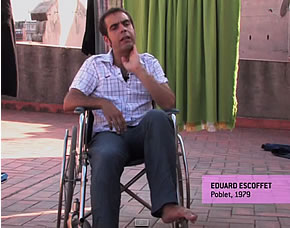
Eduard Escoffet (Barcelona, 29 mei 1979)
De Engelse letterkundige, schrijver en journalist Gilbert Keith Chesterton werd geboren in Londen op 29 mei 1874. Zie ook alle tags voor G. K. Chesterton en alle tags voor Chesterton op dit blog.
Uit: The innocence of Father Brown
« Mr. Lever at last hit on a plan to cover, since he might not obliterate, the disgrace. When you enter (as you never will) the Vernon Hotel, you pass down a short passage decorated with a few dingy but important pictures, and come to the main vestibule and lounge which opens on your right into passages leading to the public rooms, and on your left to a similar passage pointing to the kitchens and offices of the hotel. Immediately on your left hand is the corner of a glass office, which abuts upon the lounge—a house within a house, so to speak, like the old hotel bar which probably once occupied its place.
In this office sat the representative of the proprietor (nobody in this place ever appeared in person if he could help it), and just beyond the office, on the way to the servants' quarters, was the gentlemen's cloak room, the last boundary of the gentlemen's domain. But between the office and the cloak room was a small private room without other outlet, sometimes used by the proprietor for delicate and important matters, such as lending a duke a thousand pounds or declining to lend him sixpence. It is a mark of the magnificent tolerance of Mr. Lever that he permitted this holy place to be for about half an hour profaned by a mere priest, scribbling away on a piece of paper. The story which Father Brown was writing down was very likely a much better story than this one, only it will never be known. I can merely state that it was very nearly as long, and that the last two or three paragraphs of it were the least exciting and absorbing.
For it was by the time that he had reached these that the priest began a little to allow his thoughts to wander and his animal senses, which were commonly keen, to awaken. The time of darkness and dinner was drawing on; his own forgotten little room was without a light, and perhaps the gathering gloom, as occasionally happens, sharpened the sense of sound. As Father Brown wrote the last and least essential part of his document, he caught himself writing to the rhythm of a recurrent noise outside, just as one sometimes thinks to the tune of a railway train."
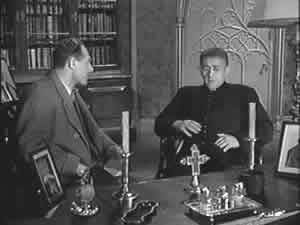
G. K. Chesterton (29 mei 1874 - 14 juli 1936)
Alec Guinness als Father Brown (rechts) en Bernard Lee als Inspector Valentine
in "Father Brown, The Detective“ uit 1954
De Franse schrijver Bernard Charles Henri Clavel werd geboren op 29 mei 1923 in Lons-le-Saunier. Zie ook alle tags voor Bernard Clavel op dit blog.
Uit: Malataverne
« Robert ne s’arrêté qu’au pied du chemin des Ferry. Là, il attendit quelques minutes en reprenant son souffle. Il calcula qu’il n’avait certainement pas mis plus d’une demi-heure pour monter. Depuis le dernier tournant, il avait vu de la lumière dans la cour, mais elle s’était éteinte aussitôt. A présent, seules les branches les plus basses du tilleul étaient éclairées. Sans doute le volet n’était pas encore mis à la porte-fenêtre de la cuisine. Il allait se décider malgré tout à descendre dans le pré où peut-être Gilberte l’attendait encore, lorsque la lampe se ralluma. Le tilleul s’agitait ; ses feuilles luisaient, éclairées par-dessous, et c’était par instant comme un grand vol d’étincelles….
(…)
A la limite du Bois Noir, Christophe s'arrêta. Sans se retourner, le corps incliné et le cou tendu en avant, il fit un geste rapide de sa main ouverte. Les deux autres s'étaient déjà immobilisés à quelques pas derrière lui. Retenant leur souffle, ils écoutaient, sans quitter des yeux sa silhouette qui se détachait sur le ciel encore clair."
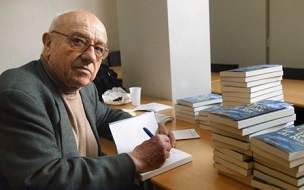
Bernard Clavel (29 mei 1923 – 5 oktober 2010)
De Hebreeuwse dichteres, schrijfster en letterkundige Leah Goldberg werd geboren in Königsberg (Pruisen) op 29 mei 1911. Zie ook alle tags voor Leah Goldberg op dit blog.
She Still Had
She still had the scent of the sea,
of shells, orange peels, the warm wind of almost-summer.
and that magic of something uncertain-
known like a dream already dreamt.
Surrounded by water and light, a hundred ripples
held in her a taste of salt. longing-
my insatiable youth, my parched sands,
all the crowns of In)" sadness scorning the kingdom-
and the city. a white island on green waves.
Then I Walked 'l'hrough the World
Then I walked through the world
as though someone adored me.
Laughter unfurled through heaps of stones,
and a wind through fathomless skies.
Then I walked through the world
as though someone dreamed me fair.
Across the night abysses bloomed
and the sea's mirror painted my face,
as though someone were writing poems about me.
I walked, until I reached an utter stillness within:
then, it seemed. something might begin.
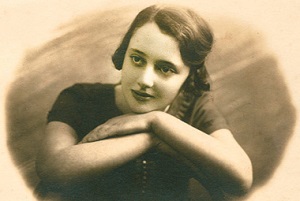
Leah Goldberg (29 mei 1911 – 15 januari 1970)
Op 16-jarige leeftijd in 1927
De Engelse dichter en schrijver Terence Hanbury White werd geboren op 29 mei 1906 in Bombay (Mombai). Zie ook alle tags voor T. H. White op dit blog.
Looking At The Skull Of St Andrew On The Altar At Amalfi
This skull is the deserted egg of an extinct species,
Bleached, blown, and long past being stale or rotten,
A mineral remnant, one of the collector's pieces
In which the Dodo of the mind was once begotten.
I feel my own skull, through its warm and mobile coating
Of quick, comfortable hair and the neck's firm flesh,
Nestling in rosy enclosure, cushioned and cradled, floating
In the fruit's womb, a nutty kernel, a fledgling fresh.
How smoothly it articulates upon its nervous column,
Nourished with scarlet sap in the rich autumn!
How fruitfully it sniffs up balmy aromas through its five
living issues,
Warm and ripening in its cradle of juicy tissues!
Strange but natural that my cosy kernel —
Its flesh fermented — must later bleach alone,
A fruit no longer, but self-sufficient: an eternal,
Hard-shrivelled, clean-nibbled, pleasant, peachless stone.
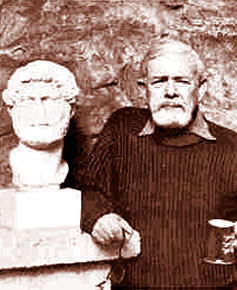
T. H. White (29 mei 1906 – 17 januari 1964)
Zie voor nog meer schrijvers van de 29e mei ook mijn blog van 29 mei 2011 deel 1 en eveneens deel 2.
29-05-2015 om 18:36
geschreven door Romenu 
Tags:André Brink, Eduard Escoffet, G. K. Chesterton, Bernard Clavel, Leah Goldberg, T. H. White, Romenu
|

